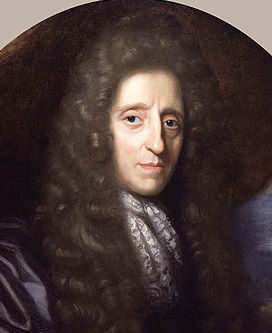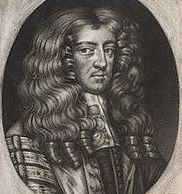John Locke
John Locke came from the seafaring district of England that produced many of her legendary explorers and pirates as well as the men who spearheaded her effort to colonize the new world. John Locke senior had been a Captain in the parliamentary armies. In later life he served as Clerk to the Justices of Somerset, a post in which he was dependent for patronage on the powerful Popham family.The Pophams were early and large investors in the Virginia Company and principals in the failed effort to establish a colony at the mouth of Maine’s Kennebec River. Young John Locke would therefore have been familiar with the business of colonization from an early age.
resumed with the restoration of Charles II in 1660. Charles rewarded Shaftesbury by naming him a member of his privy council.
In 1663 Charles granted the "Province of Carolina" to Shaftesbury and seven of his wealthy associates. The original plan for its government followed the vision of Sir Edwin Sandys: Carolinians were to own land privately and have a general assembly in which they could determine “the genll good of ye said plantacon.”
Locke had been in Shaftesbury’s service for two years when Shaftesbury called upon him to draft a new plan on which to build the colony. Locke’s “fundamental constitutions of Carolina” is a startling departure from the Lords’ 1665 Concessions and Agreements. The plan Locke drafted contains no trace of the political principles that would allow his Second Treatise, which he produced little more than a decade later, to pass the test of time. The earlier work contains nothing of natural law or political equality. There is no social contract or comparable commitment by which the community’s inhabitants transferred their personal sovereignty to a “legislative”. It makes no mention of popular consent or majority rule. While it does assume private property, it uses property to define a social hierarchy that distributes political power to a privileged class and to frame a government with characteristics of a socially stratified and economically repressive political tyranny.
By 1675, Shaftesbury had concluded that Charles’s ministers were laying groundwork for an absolute monarchy. As his fears sharpened, Shaftesbury became increasingly suspicious of the Duke of York's Catholicism. To prevent the growth of "popery and arbitrary government", Shaftesbury advocated strengthening the Parliament with more frequent sessions and other measures that would prevent a Catholic from succeeding Charles II. In the course of this campaign, Shaftesbury called upon his secretary to draft a “treatise of government” to refute the patriachal social theory of Sir Robert Filmer, which rationalized a divinely-ordained, hereditary and absolute monarchy and the divine right of kings.
Shaftesbury’s political machinations led to his arrest for high treason in 1681. This prosecution was dropped after several months, but a year later, fearing a second prosecution, Shaftebury fled to Amsterdam where he fell ill and died, in January 1683.
Just when Locke penned his Second Treatise of Government is not known. He may well have written it after Shaftesbury’s death. In any
event, he did not publish it until opposition to James II was strong
enough to bring William of Orange to England. Against this backdrop
of rebellion and civil strife, Peter Laslett describes Locke's Second Treatise as “a demand for a revolution to be brought, not the rationalization of a revolution in need of defence.”
In the Second Treatise, Locke presents the logic for the society that would replace the patriarchal system of Filmer and King James II.
“We have seen,” Laslett observes, “that he showed no sign of an
interest in the theory of property before he sat down to this polemic and found himself faced with an argument in favour of primitive communism which was very difficult to refute unless a new justification of ownership was devised.”
Locke presented his case for a political society governed by the will of the majority in these words, “For when any number of men have, by the consent of every individual made a community, they have thereby made that community one body with a power to act as one body, which is only by the will and determination of the majority.” That is to say, sovereign power in Lockean political society resides in the body politic and its majority exercises this power by expressing its opinion on matters pertaining to the common good. When the majority speaks, according Locke, the issue is “concluded” and individual members of the body are obliged to obey.
William’s victory over James at Boyne in 1690 concluded the Glorious Revolution. With this victory, Parliament secured its authority to make the law and define the common good by the will of their Lockean majorities. Locke's view of society thus eclipsed Hobbes's. The new Lockean way of seeing man in society proved useful to America's patriots who borrowed on it eight decades late to form the world's first modern political system.
The opportunity to participate in it open-
ed to him when he entered the service of
Anthony Ashley Cooper, the adventurous
Earl of Shaftesbury, which he did in 1667.
Shaftesbury had thrown his support to
Parliament in 1644. But in 1654, hav-
ing come to distrust Oliver Cromwell’s
autocratic rule, he turned against
Cromwell’s protectorate. After Cromwell’s
death in 1658, Shaftesbury supported
the restoration of the monarchy, which






